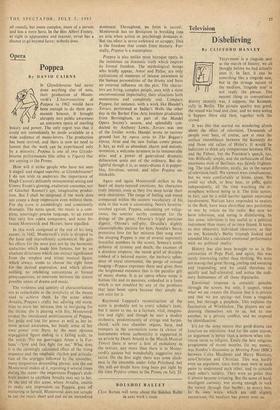Television
D isbelieving
By CLIFFORD HANLEY
It was this that started me wondering afresh about the effect of television. Thousands of people over here, of course, saw at once the surface resemblance between the Kennedy do and those old rallies of Hitler's. It would be ludicrous to draw any comparisons between JFK and the Rihrer, but the President's speech, too, was Biblically simple, and the enthusiasm of that enormous mob of Berliners was faintly frighten- ing. The real difference, surely, lay in the nature of television itself. We viewers were simultaneous, but we were comfortably at home, alone. We could say uhuh, or hear hear, or piffle, quite independently, all the time watching the at- mosphere without being in it. The little screen, in fact, can be a solid barrier against emotional involvement. Nations have responded to orators in the flesh, have been electrified into patriotism or war by voices on the radio. But now we have television, and seeing is disbelieving. In this sense, television is less useful as a political instrument than many of us once feared. It turns us into observers, individual observers; so that to me, Kennedy's Berlin triumph looked and sounded like a calculated emotional performance with no political reality.
History has also been brought to us in the coronation of Pope Paul, and again, this was surely interesting rather than thrilling. We were not among that great throng, jostling and sweating and responding; and we could therefore sit quietly and half-alienated, and notice the ordi- nary humanness of all those dignitaries.
Emotional response is certainly possible through the screen, but only, I suspect, when what we see creates the illusion that it is private and that we are spying—not from a ringside seat, but through a peephole. This explains the fascination of Wimbledon. The players are ad- dressing themselves not to us, but to one another, in a private conflict, and we respond by identification.






































 Previous page
Previous page